False Beginnings:
early nineteenth century episodes in the human sciences
(ancestors of this paper were delivered as talks
in the French Cultural Centre in Khartoum in 1971 [in French],
to the Kong Kong Philosophy Society in 1987,
to the Philosophy Department of Virginia Polytechnic and State University in 1991;
further revisions were made in Oxford in 2017;
the original research was carried out in around 1964)
introduction:
the epidemiology of certain ideas
There are two beginnings in this paper. First, a launching of social anthropology in 1800. It was indeed launched,
as we shall see. But it sank within about five years, and it was more than a century before it was properly relaunched.
Second, a launching of psychology. This launching had some success, but it gave a central
role to introspection, which many today would regard as a mistake, or at best as problematic.
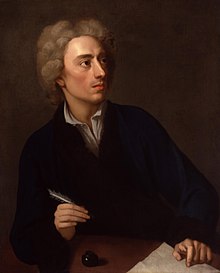
It is to be noted that these false, or apparently false, beginnings are set in the context of other beginnings
for the human sciences,
which were beginning to take shape. Already more than sixty-five years earlier
Alexander Pope had written these famous and prophetic lines:
Know then thyself, presume not God to scan;
The proper study of mankind is man.

In describing some episodes of this history, I am influenced by Dan Sperber’s
‘epidemiological’ model of culture, which views the spread, development,
prevalence and dying out of ideas and practices in a way comparable to
the way in which the epidemiologist views the incidence of diseases and other disruptions of health in
populations. A consequence of this is that we cannot expect to find
a single kind of cause or mechanism for these changes. Thus an adequate understanding of how scientific
endeavours develop, succeed, or wither away will not be achieved by the adoption
of a single methodology. For present purposes, I allow myself to make eclectic use of different
historical and social explanations, according to the case.
background
There is no harm in sketching a conventional background to my period, provided
that we remember that it too may call for correction in the light of more
detailed historical studies which would be duly suspicious of a view of
intellectual history as a systematic and simplifying chronicle of doctrines.
It was in the eighteenth century that the project of a science of man first
emerged in an overt form. The context, of course, was that ‘natural
philosophy’, or the sciences of nature, had already proved their worth,
both in terms of our understanding of the world around us, and in terms
of our ability to predict and manipulate it. The sentence which begins
one crucial text expresses a commonplace of enlightenment thought: ‘It seems
astonishing that, in an age of egoism, it is so difficult to persuade man
that of all studies, the most important is that of himself’. This statement begins a 57 page
publication of the Société des Observateurs de l’homme.
It was a paper delivered to the Society by Joseph-Marie de Gérando
at the very end of the eighteenth century (an VIII)
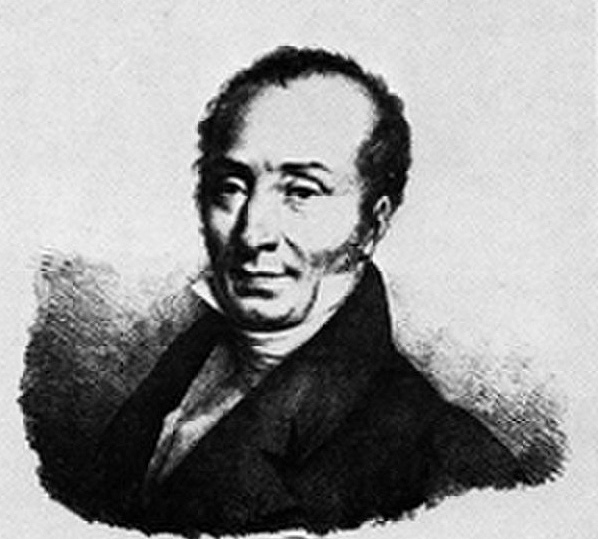
The project of a ‘science of man’ proved problematic. This science should have been and indeed
was also called ‘anthropology’. However, there was already a bifurcation
in this period between the mental and the physical. And this has
yielded a trifurcation: the term ‘anthropology’ now has three different
meanings: (1) ethnography, (2) human historical zoology, and (3) philosophical
theories about the nature of human beings. This distinction between
‘social anthropology’, ‘physical anthropology’ and ‘philosophical anthropology’
creates questions. We shall investigate this fragmentation as it occurred in early nineteenth
century France.
protagonists
Let me first introduce five people. They were very different in character,
temperament and interests, but they all played their parts in the events
which I shall describe below, and they were related in a complex network
of links, including political, social or intellectual collaboration or
controversy, the one reviewing the writings of another, common membership
of learned and other societies, or informal discussion groups, as well
as friendship, and sometimes mutual suspicion or dislike.

First, Nicolas-Thomas Baudin, who was a sea captain. He was born in 1754 on the Île
de Ré, off La Rochelle, in Western France. He was a resourceful
and experienced sailor who made his name by undertaking voyages of botanical
exploration. He signed up under Francis I of Austria, and sailed
to China, Malaya, the Cape of Good Hope, and the West Indies, collecting
botanical specimens, which were left in Trinidad. He sailed from
Europe again in 1796 to collect them. It turned out that he had to
steer through the reefs of politics and war. He was in fact prevented
by the British authorities from collecting his Trinidad specimens, since
his ship’s passport was questioned by the enemy. But after changing
vessels twice, including buying and renaming a captured English ship, he
made a further extensive collection of specimens in Puerto Rico, and returned
to France. English patrols prevented him from putting in at Le Havre,
but he was able to anchor at Fécamp, and his specimens were rushed
to Paris, to head a procession of Bonaparte’s
Italian trophies in 1798. It was a heady moment. The toils
and heroisms of war, the spirit of adventure, the blandishments of national
pride, the advance of science. Baudin was well-placed to press the
Minister of Marine, the Muséum d’Histoire Naturelle, and
later the Institut national to sponsor a new scientific expedition
with the special object of exploring South and South-West Australia, till
then unknown. In a letter to the Institut, he wrote: ‘History
and political economy need more extensive information about the peoples
living in these climes, details about population, customs, forms of government’
(March 1800).
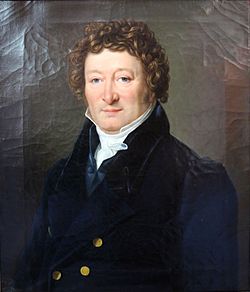
But how was such research to be carried out ? We introduce our second
actor: Louis-François Jauffret. He was born in 1770, and was the younger brother of André, future Bishop of Metz.
After retiring to Orléans during the reign of terror, after the
French Revolution, he returned to Paris, and made a name for himself as
a writer of works on education. He also became the ‘scientific adviser’
to the Société de l’Afrique intérieure.
He delivered an extensive public lecture series on the natural history
of man, covering social rather than physical anthropology, though based
on secondary sources rather than on fieldwork; in 1799 he was a founder, with friends, of the
Société des Observateurs de l’Homme. We shall
have occasion to return to this society, which had a lively and varied
membership, including our third actor, the 27 year old Joseph-Marie de Gérando,
who had just received a prize from the Institut for a monograph
on signs (Des Signes et de l’art de penser considérés
dans leurs rapports mutuels). This monograph displays its affiliation
to the then current philosophical orthodoxy, namely idéologie.
This ‘science of ideas’, late-born offspring of the empiricist tradition,
was to be the central science of man. But though de Gérando
began his intellectual career in this way, his interests spread or deviated
as time went on, especially as Bonaparte began to turn his face against
these philosophers. He wrote a large and boring history of philosophy
of an unpleasantly systematic kind, he discoursed on the ‘sauvage’, the ‘wild
boy’ of Aveyron, and he wrote, for instance, on the relations between working-class
morality and industrial development. He was secretary of the Society
for Elementary Education, and Professor at the Faculté de Droit.
He was ennobled, and was named commander of the Légion d’honneur.
An establishment figure who held high office under successive regimes,
he had an eye for the main chance.

One of his friends, with whom he had philosophical discussions, is our
fourth actor. Maine de Biran came from the Périgord. He was born in 1766.
His father was a doctor, and taught his son himself in the early years.
Later Biran was sent to a Jesuit school for his secondary education.
At the age of 19 he went to the king’s court, as a member of the king’s
bodyguard, and was wounded at the defence of Versailles in 1789.
He worked for some time towards joining the army as a military engineer.
His was an old bourgeois family which perhaps aimed at ennoblement through
this channel.
Biran never became a military engineer. After the Revolution, he
held public office, under the revolutionary regime, under the consulate,
the empire, and the Restoration, both in Bergerac, and in Paris.
He was politically and administratively active all his life. But
he was less of a trimmer than Gérando, being willing to hold out
against Napoleon’s imperial excesses at the risk of his office.
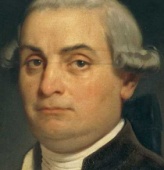
Still, from a youth, his chief interests were philosophical. In the
1790s, he read hungrily. Mathematics and natural science, psychology
and philosophy, morality and politics. Seneca, Montaigne, Rousseau,
Condillac, Bonnet, Bacon, Locke, Van Helmont, Boerhaave, Beccaria. During this
early period, he had the ambition to establish ‘an experimental physics
of the mind’ (Maine de Biran, Vieux Cahier, 1794). (The phrase is
borrowed from d’Alembert, in the discours préliminaire
de l’Encyclopédie, 1751). He also took note of Beccaria’s
comparison between gravity in physics and sex in the human sciences, as
well as making himself well-versed in contemporary physiological research.
He wrote incessantly, but published very little, in spite of pressing requests.
For our purposes, it is useful to note that he published a review of a
book by Gérando on epistemology in the Magasin Encyclopédique
in 1802. Leading intellectual figures after his death in 1824
called him ‘the master of us all’, ‘the greatest metaphysician of our time’,
yet, as a philosopher, he was hardly known to any except the few who sat
round and discussed intellectual questions with him, or those who read
and awarded prizes to the various memoirs he submitted to the Institut
de France, the Berlin Academy, the Royal Academy of Copenhagen, or those
again who heard the papers he delivered to the medical society of Bergerac
(which he founded to discuss subjects like dreaming, phrenology, unconscious
mental processes), or to his own philosophical society which met for some
years in Paris in the second decade of the nineteenth century. These
few were philosophers, natural scientists, men of religion, public figures,
doctors, mathematicians.
Biran planned, for much of his mature life, a major work on the foundations
of psychology, or as he finally put it, on ‘anthropology’. This seems
to portend a fourth conception of the science of man, so that our trifurcation
would become a quadrifurcation. But Biran never completed or published
this work. To adapt a phrase, he was a one-book man who never wrote
the book (Gouhier, 1948, p. 6).
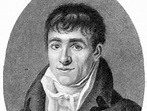
Our fifth and final actor is a young student, François Péron.
He was born in 1775. He joined the army in 1792, lost his right eye
in battle, and was taken prisoner of war by the Prussians in 1793.
Released in 1795, he returned to France, and in 1797 began studies in Paris
as a medical student, just at the time when Baudin was pressing for his
expedition. He became associated with the Sociéte des Observateurs
de l’Homme. We shall hear more of Péron shortly.
episode I:
The Society of Observers of Man
We find ourselves at a time when Europeans were paying more and more attention
to remote or so-called primitive peoples, ‘savages’. The ends of
the earth were becoming not merely places of adventure or trade, but also
the loci of colonial problems and ambitions. Moral and practical
problems were also in full view. The English movement for the abolition
of slavery was young, and its French counterpart, the Société
des amis des noirs still younger. It was not so long since Condorcet
had published his reflexions on the enslavement of negroes, under the pseudonym
Joachim Schwartz.

Treating these problems, steering through these prejudices invited an advance
of knowledge. It should no longer be a matter for philosophical speculation
or sheer prejudice whether the ‘savage’ is noble or bestial or just another
fellow-creature, but a matter for empirical enquiry. Jauffret, and
a group of friends, founded in December 1799 the Société
des observateurs de l’homme. A journal of the time, the Magasin
Enyclopédique, wrote as follows:
‘In taking the name Société
des observateurs de l’homme, and the ancient motto ‘γνῶθι σεαυτόν’,
Know thyself, the society has devoted itself to the science of man,
in his physical, moral and intellectual existence; it has called to its
observations the true friends of philosophy and moral reality, the deep
metaphysician, the practical doctor, the historian, the traveller, the
student of the nature of language, the educationalist. In this way,
man, followed and compared in the different scenes of life, will become
the subject of research the more useful as it is free from passion, prejudice
and excessive systematisation. The observers of man will work in
good faith, and with the object of gathering more facts.’
We find that this society met regularly. Distinguished men of letters
gave papers to it on a great variety of topics. But the empirical
basis of these contributions was often weak, lacking in order and second-hand,
and the question of method rarely arose. What facts do we need in
anthropology, and how should they be gathered ? As we have seen,
an important opportunity for empirical research had serendipitously arisen
just at the time of the foundation of the society.
An Expedition to New Holland
Already in 1798, a new voyage of exploration by Baudin had been approved
in principle. The Institut successfully took up the
project. In July 1800, Jauffret spoke as follows to the Society of
Observers of Man:
‘Developing the science of man will bring a new age in
the intellectual history of mankind. To achieve its aim, our society
must not omit any opportunity of perfecting anthropology.
There is one before us. An expedition is about to take place under
Captain Baudin. I am requested to ask the society to provide sets
of specific instructions on the research that should be carried out on
human beings in the various countries to be visited by Baudin’.
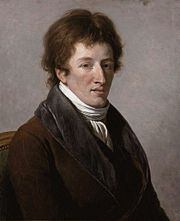
The well-known zoologist Cuvier, wrote a memoir on physical anthropology. And
Degérando, another of our actors, wrote a remarkable piece called
‘Observations on the various methods to follow in the observation of savage
peoples’.
It was remarkable since it prefigured rather closely methods of ethnographic
fieldwork recommended in today’s manuals. Degérando said that
the observer, the ‘philosophical traveller’, ‘should live with the people
to be observed, should learn their language, should avoid extrapolation
from their own culture, should try to grasp the ways of thinking of the society
under observation, should study its kinship patterns, its political, military,
legal, economic, moral and religious institutions and ideas. All
this in an extended piece, subsequently published by the society in a 57
page printed book.
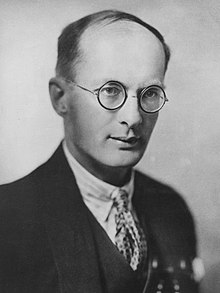
Conventionally, we might have thought that social anthropology, as a study
based upon fieldwork and involving what has come to be called ‘participant
observation’, was not really conceived until Malinowski’s pioneering work.
It is something of a shock to find so
modern a description of its aims and methods written in 1800.
Now, by the time that de Gérando’s memoir was delivered, the scientific
personnel of Baudin’s expedition had already been chosen: 22 men, astronomers,
geographers, zoologists, botanists, mineralogists, artists, gardeners,
but no members overtly charged with anthropological study, no ‘philosophical
travellers’. At this point, the medical student Péron rushed
out a printed memoir called Observations on anthropology, the necessity
of promoting this science, and the importance of including in Baudin’s
expedition one or more scientists specifically entrusted with research
on this subject. This short piece does not allude to the considerations of de Gérando,
and seems that the author was a protégé of Cuvier. But as a result of it, Péron
was additionally appointed to the expedition.
Everything suggested that social anthropology was conceived, and that it
might shortly come to birth in the field.
From the beginning, the explorers were dogged with difficulties.
When they put in at Mauritius to revictual, the French colonists refused
at first even to admit them to port, fearing that they might have come
to put into effect the revolutionary government’s decree abolishing slavery
in French colonies. The extensive delay caused by this problem seriously
disrupted the timetable, and was consequently one of the sources of many
subsequent difficulties.
Nevertheless, the expedition spent two months in mid-1801 in the area south
of Perth, near what are still called ‘Cape Naturaliste’ and ‘Géographe
Bay’ after the two vessels of Baudin’s expedition, nearly three months immediately
after that on the island of Timor, three months in Van Diemen’s Land, as
Tasmania was then known, and another six months at Port Jackson (Sydney).
These four extended stays could have offered Péron the opportunity to make
a start on anthropological work in the field.
What we find, however, is disappointing. Generally, Péron’s
observations on indigenous inhabitants read little better than an ordinary traveller’s report, and there
is little sign that he understood, still less followed, the perceptive
warnings and instructions of Degérando’s memoir.
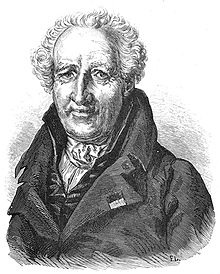
Baudin himself, in a letter to Jussieu, wrote more interestingly about
the native inhabitants of Bruny island. He started by remarking on
the difficulty of drawing conclusions about the character of the inhabitants
on the basis of their behaviour towards the visitors. He described
their physical appearance, their reaction to various sorts of presents,
their unfamiliarity with the use of nets for fishing, their established
fear of firearms, their use of tattooing, their custom that women should
do the work (like gathering sea food), their canoes and the manner of manufacturing
them, their nudity, their custom of the men habitually holding the foreskin
between finger and thumb, making it very long, their amazement at the sight
of goats and a sheep, which they attempted to engage in conversation.
Baudin noted that some ‘scientists on the expedition’ had concluded that
these aborigines treated the sun as a divinity (he may have had Péron
in mind), but that their evidence for this was very weak. We then
read of an incident on Maria island. Some armed locals captured a
ship’s carpenter while he was cutting firewood. They stripped him
naked, and carefully examined his whole body, after which he was allowed
to dress and go away unharmed with his axe. Baudin commented: ‘It would
perhaps be just as interesting for the study of man to know what the thoughts
of the carpenter were in these circumstances, as to know the reasons for
the curiosity of the savages’!
In Sydney, the expedition was well-received by King, the English governor.
The sick were tended in hospital, ship’s supplies were provided, and research
in the territory by the French scientists was encouraged.
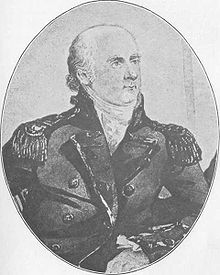
King was however concerned about possible French colonial ambitions with
regard to Tasmania. Baudin replied to a letter of his on this matter
in the following terms: ‘I have never been able to conceive that Europeans
have either justice or equity on their side when in the name of their governments
they annex lands newly found by them, but already inhabited by men who
do not always deserve the name of “savage”. I have no knowledge of any pretensions
the French government may have to Van Diemen’s Land, but I think its title
no better grounded than yours.’
What did Péron do during these periods in New Holland? Did he employ the opportunity
for anthropological fieldwork? Rather little emerges, apart
from his observations with a device specially made for the expedition,
called a ‘dynamometer’. Péron tried to measure the strength
of 85 aborigines using French and English subjects as control-groups.
The objective was to investigate the hypothesis that ‘civilisation varies
inversely with physical strength’! This work is of little interest except to the
extent that Péron shows that it disproved the above hypothesis.
We learn what Péron was actually doing during much of the time the expedition spent in Sydney
from evidence arising a year and a half later, at the end of 1803.
By then, the expedition had reached Mauritius again on its return voyage
to France, after a difficult journey. Many members of the expedition
had died, including Captain Baudin himself, and five of the scientific
members, while a further 11 of the scientific members had abandoned the
expedition at Mauritius or Timor. But Péron lived, and took
the opportunity to write to one of Napoleon’s generals, Count Decaen, who
had been appointed Captain-General of French possessions to the East of
the Cape of Good Hope, and who was then in Mauritius.
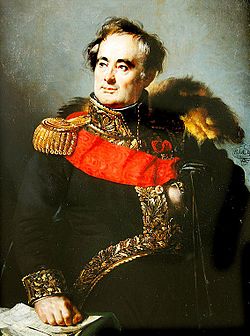
In a long report, Péron wrote as follows: ‘Always alive to what
might humiliate the eternal rival of our nation, the first consul, immediately
after the revolution of 18 brumaire, decided on our expedition. Its
real and official purpose was too important to do anything but conceal
it from all the peoples of Europe, and particularly from the cabinet of
St James; we had to obtain universal agreement, and for that purpose, it
was essential to appear quite unconcerned with political matters, and to
concern ourselves only with collections in the field of natural history.
But it was far from our real object to confine ourselves to this kind of
work, and if I had time, it would be very easy, citizen Captain-General,
to show you that all our research in natural history, trumpeted with such
ostentation by the government, was throughout only the pretext for its
venture. Thus this expedition was in its principle, in its object,
in its organisation, one of those brilliant conceptions which are to the
eternal glory of our present government.
After penning intemperate and inaccurate attacks on the dead Captain Baudin,
as unfit for his command, Péron goes on: ‘You asked me to convey
to you the information I was able to gather on the colony of Port Jackson.’
He then gives an extremely detailed account, with maps and drawings, and
concludes: ‘I must confine myself to declaring that I share with all those
of my colleagues who have particularly concerned themselves with the organization
of this colony, the opinion that it should be destroyed as soon as possible
.....’
So we learn why Péron had little opportunity for anthropological
fieldwork during the long stay at Port Jackson. He was busy spying.
Jorion [1980, p. 94] suggests that to attach importance to this activity of Péron
shows me to be a chauvinist. This accusation is not well-founded. The question is to
understand why anthropological fieldwork failed to establish
itself. And the answer is that Péron in fact put spying above fieldwork
in importance. This failure is all the more poignant given that the
context of this espionage was the colonial ambitions of France, which can make
for a more intimate conflict with the profession of anthropology.
As we have seen, Baudin wrote: ‘I have never been able to conceive that Europeans
have either justice or equity on their side when in the name of their governments
they annex lands newly found by them, but already inhabited by men who
do not always deserve the name of “savage”’. In making this point,
I am not taking sides in the Napoleonic wars, as Jorion seems to suggest, but offering a partial explanation
of the withering of the new science. Whether Péron, as he suggests, really
was secretly appointed for this purpose at the time that he joined the
expedition is difficult to determine, but seems less than likely. Only four years later, he wrote
quite differently of Napoleon’s intentions:
‘On the far shores that we were to visit dwelt peoples interesting to know;
the first consul wished representatives of Europe to these forgotten men,
we should appear among them as friends and benefactors.’
However that may be, in Péron’s unsuitable hands, anthropology had failed after
all to come to its birth during the expedition. The four volume account
of the expedition of which he was co-author contains nothing, in my view, which lives
up to the instructions of Degérando. (Péron & Freycinet,
1807-16, vol. I, see p. 10)
Meanwhile, in Paris, the Observers of Man continued to meet. In September
1802, in an address, Jauffret, speaking of the ‘tribes which so little
deserve the damaging scorn in which we hold them’, said:
‘There was a time when the desire to observe man counted for nothing in
government-sponsored expeditions. As for commercial expeditions,
their only purpose was to go spreading our vices afar, and doing dishonour
to humanity. The end of the eighteenth century opened a new path,
and ..... correspondents of the society have gone to study man in the vast
theatre of the universe.’
After mentioning de Gérando’s memoir, Jauffret continues:
‘It was the task of the society to lay the first foundations of an enterprise
whose importance cannot be mistaken, and whose success will always be on
the increase.’
Three other empirical projects were mentioned in the same meeting: to observe
deaf-mutes from birth; to set a prize essay subject on the question what
is the influence of different professions on the character of those who
exercise them; and to persuade the government to give its approval for
the following plan:
to make careful observations, for 12 to 15 years, of four or six children,
an equal number of each sex, kept from birth in the same enclosure, remote
from any social institution, and left, for the development of ideas and
of language, to natural instinct alone.
I have found no evidence that any of these ill-assorted plans was actually
followed up.
The Society was faltering; a satire was published anonymously in 1803 entitled
‘Report of a meeting of the Société des observateurs de la
Femme’[note Lemontey]. In the meeting imagined by the satirist, a prize was awarded
for the best essay on the subject ‘Apology for the slavery of women’.
There had been 468 bad replies, and the prize went to the worst, written
by a planter of Jamaica, Dominic Hangman, whose essay bore the epigraph
‘The slavery of women is justified by reasons as good as those for the
slavery of negroes.’
By the time the expedition returned to France in 1804, first consul Bonaparte
had become emperor Napoléon. And the emperor had turned away
from colonial ambitions, and moreover, as often happens to those who obtain
substantial political power, he had turned against the intellectuals, especially
the philosophers. In the very month in which the Géographe
docked in Le Havre, the Society of Observers of Man uttered a desperate
and expiring sycophancy:
Whereas the foundation of this society dates back to the first months in
which the reins of government had been confided to the hands which assured
France of prosperity without bounds;
and whereas since that moment it has not ceased openly professing those
principles whose bases it has found in the deepest study of the human heart
and the social order, and which have at length prevailed for the well-being
of the state;
and whereas it is above all by offering to the public the first
volume of its memoirs that it must give an unmistakable proof of its respectful
devotion and of its high admiration for the august person of Napoléon;
the society decrees that an approach will be made to his Imperial Majesty
to request permission to dedicate to him the memoirs of the society, and
to adopt the title Imperial Society of the Observers of Man.
The society ended at this point, or, at least, I have found no further
trace of it. Even this flattery did not gain the emperor’s favour.
Baudin was dead, Péron was a spy, Jauffret could not find employment, got
into debt, and retreated to Marseille as a Museum director.
And what of Degérando? In 1803 he published a favourable
review of a five volume book about colonial administration (Magasin Encyclopédique,
an XI-1803, IV, pp. 294 ff., reviewing Malouet), in which he cited with
approval a passage recommending the neutrality of colonies in war, the
reason for this recommendation being that if colonies do take part in wars ,
the adversary may be forced to arm his slaves, and in this case
‘I become, against my own interest, the ally of our common enemy’.
France had just repealed, in 1802, the decree abolishing slavery, and Degérando
was not one to take a stand on the matter. But it is difficult to
reconcile his approval of this author’s view of slaves with the
spirit of his book on anthropological fieldwork written only three years earlier.
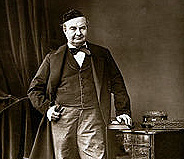
Sainte-Beuve later wrote of Degérando: ‘Some minds are essentially
flabby, like Degérando: they go from one period to another adapting
themselves with ease and even with talent; but don’t expect any originality
.... ; they make everything look uniformly drab. It’s not a pretty
image, but minds like this are not only flabby, they spin out like macaroni
and can be drawn out indefinitely without ever breaking’ (Ste-Beuve, Causeries du lundi, LXXXII).
This is surely too harsh a judgement, for Degérando’s memoir itself was a
real achievement, and if Jorion is right, served as a model in the 1840s
for the ‘general instructions for travellers’ published in the first issue
of the Mémoires de la Societé d’Ethnologie in 1840,
which were themselves ancestors of the much more modern Notes and Queries fieldwork
manuals (Jorion, 1980, p. 94).
Our first episode, then, shows a flowering of interest in the science of
man, the conception of a new empirical science, known today as social anthropology,
but then the abortion of the embryonic discipline in an increasingly unfavourable
political and intellectual climate. There had come into being an
ideal of ‘useful knowledge’: the true and the useful should be one.
If there was no longer any use for anthropology arising from colonial ambitions,
its interest, and indeed its intellectual status, became suspect (see further,
Moore 1969/2004, pp. 51-8).
episode II:
Maine de Biran: an unfinished journey
The external approach to the science of man, the idea that it should be
based on fieldwork, had, for the time, failed. What of the internal
approach ?
The journeys of Maine de Biran did not take him over oceans, or to remote
countries. His explorations were rather, to use his own image, in
the subterranean seas of the human mind. He wondered whether some
day a new Columbus might chart these seas. He held that psychology
had to be the fundamental human science, and — moreover — that the basis (though
not of course the whole) of psychology must be found in our inward knowledge
of our own mental life and operations.
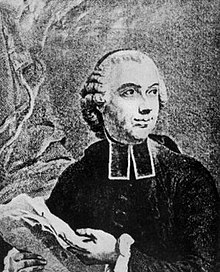
He started as a good empiricist, inheriting a tradition from Bacon, the
British empiricists, and their eighteenth century French successors.
It was clear to him that real advances had been made in this tradition
in our understanding of human beings. Take, for instance, the issue
of language. Locke had held that the function of language was to communicate
ideas, which were prior to it, and might exist without it. His eighteenth
century French successor, Condillac, on the other hand, while maintaining
in several other ways a traditional empiricist position, held that it was language
which transformed a sensation into an idea. The language of pain,
for example, was an extension of the natural expression of pain, according
to Condillac; the idea of pain is what we have when we can speak of it.
But while approving of this tradition, and in a way belonging to it, Biran
also dissented. He came to the view that the empiricist model of the mind
was essentially passive. It had a framework for dealing with our
reactions, but none to account for our actions.
Biran’s view was that our experience of willed activity was a fact which
was the fundamental starting point for psychology and hence for the human
sciences in general.
This principal thought stayed with our author throughout his life.
Soon after Degérando wrote of the important role of language in anthropological
fieldwork, Biran was to address a comparable point in psychology.
He offered a distinction between passive and active habits. Our use
of language would be primarily an active habit, something we have to work
at, something which enables us to make distinctions, to recognize, to judge.
So even perceiving something, he thought, could not be thought of as passively
receiving a sensation in the way of old empiricists; it had to be regarded
as an act, and an act involving our habits of language.

At a time shortly after the end of the Society of Observers of Man, Biran’s
interests broadened. He became interested in physiology, in pedagogy,
in dreaming, in the unconscious mind. He started a medical society
in Bergerac to discuss some of these issues, and he founded a school on
new principles, bringing a pupil of Pestalozzi from Switzerland to teach
there.
During this period, from about 1805 for some six or seven years, he was
particularly concerned with the thought that psychology had to deal with
the role of the body, not from a traditional dualist perspective, but at
the level of its mixture with our mental life in its all-important underlayer.
And this underlayer, impossible to admit at all from a Cartesian point
of view, since it has to be conceived as a layer of mental episodes and phenomena of which we are not conscious
— this underlayer had to be regarded as forming the basis of and the materials
for our ordinary conscious life.
When he left Bergerac in 1812, having been elected deputy, and went to
Paris to take up these new duties, Biran was exposed to active intellectual
circles, and — as a result of these contacts, as well as of problems arising
in the development of his own ideas — he began to take an interest in metaphysical
questions about substance and existence which he had formerly set aside,
developing an increasing interest in Kant and Leibniz. His earlier
view was more purely phenomenological. We consider our experience,
we abstract, we put into order, we display its underlying structures.
The traditional metaphysical problems are non-problems. Later, however,
he came to the conclusion that these metaphysical questions were after
all raised in some way by his own approach, and had somehow to be dealt
with. They could no longer be set aside.
In the last part of his life, from around 1818 till his death in 1824,
he became interested, still within the framework of his psychology, in
religious questions. There was our conscious life; there was its
subconscious organic underlayer; was there also perhaps an overlayer?
Was our conscious life touched and formed not only by our bodily nature,
but also by a divine order?
However, through all these changes of emphasis, interest and concern, Biran
maintained a very similar central position.
The basic science of man was psychology. Psychology was an empirical
discipline in every sense. First of all, it depended upon reflection
or introspection, for only here could its fundamental concepts be tested,
and its starting facts be given. But it also had to call upon many
other types of empirical enquiry, physiological, medical, educational
sociological and so on. He envisaged, and drew up a curriculum of enquiry
for the sciences of man, showing how psychology should play the
role of foundation and coordinator, and how all the other enquiries might
fit in. The science of man, instead of undergoing at least a quadrifurcation,
might retain a certain unity.
And yet he never finished his major book. Indeed, it was not much less than two centuries
after Biran’s death that the first scholarly edition of his writings was completed.
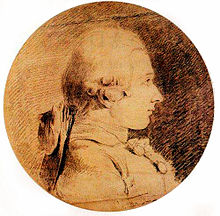
You may therefore think that Biran’s project was as still-born as Degérando’s.
But not entirely so. Biran wrote a long treatise for his friend Antoine-Athanase Royer-Collard (brother of
the philosopher, Pierre-Paul)
based on an earlier work on the relations between the physical and the mental,
to help Royer-Collard in preparing a series of
lectures on mental disorder to be given at Charenton, the famous pioneering
asylum headed by Pinel and where Royer-Collard was to become the head doctor,
the asylum where the Marquis de Sade was interned.
And in fact the first journal in France devoted to empirical psychology,
the Annales Médico-psychologiques, devoted the main article
of its second issue to a consideration of this treatise (1834). Thus,
in this and other cases we can easily show a real influence of Biran‘s
ideas. They did not die with him, but helped to fructify the infant science
of psychology. Nevertheless, the work of Maine de Biran remained
unachieved. Why was this?
I have already offered a socio-historical sketch of the failure of de Gérando’s
project. Could there be a psychological explanation
of the failure of Biran’s ambitions? This would give a suspiciously
neat symmetry to what I have been saying. For I would be giving a
sociological diagnosis of a sociological false beginning to the human sciences,
and a psychological diagnosis of a false beginning to psychology.
In fact, such a view has been put forward. Voutsinas has claimed that Biran was
narcissistic, a feature of him shown in and connected with his introspective temperament,
and thus with his view of the nature and role of psychology. Biran avoided publication, according
to Voutsinas, because he feared adverse comment. Even his death in
1824 is described by Voutsinas as a kind of narcissistic suicide. These are, I think,
extravagant speculations, lacking in plausibility.
The simpler explanation is better: that, as often happens when philosophers struggle
with difficult questions, Biran’s views changed and developed. He
hoped, indeed, to produce a definitive work; but if he failed, it was because
he could rarely bring himself to regard a manuscript as sufficiently definitive,
when new questions and ideas arose, although we know from various evidence
that he several times came very close. Finally, Biran’s elaborate
curriculum for the human sciences, his attempt to prevent their multifurcation,
was a project which of its nature required the kind of collaborative effort,
the kind of network of people with overlapping interests and activities
which existed only too briefly and insecurely for Degérando’s anthropology,
and rather too patchily for Biran’s psychology.
manuscript and printed sources
(not all these sources are mentioned in the above paper)
Baudin, Nicolas, ‘Journal de bord’, (ship’s log) manuscript (MS.943941, Bibliothèque
nationale, Paris)
---, documents relating to Baudin and the expedition to New Holland
(MS. 9439, 9440, Bibliothèque Nationale, Paris)
---, lettres à Jussieu et à Hamelin (MS. 2082, Bibliothèque du Muséum d’Histoire naturelle,
Paris)
Berthier, P., L’Abbé Sicard: précis historique sur sa vie,
ses travaux et ses succès, Paris: C. Douniol, 1873
Bory de St Vincent, Jean-Baptiste Geneviève Marcellin, Voyage
dans les quatre principales îles des mers d’Afrique fait par ordre
du gouvernement pendant les années 1801 et 1802, Paris, an XIII-1804
---, ed. Histoire Scientifique et militaire de l’expédition en
Égypte, Paris, 1832
---, ed. Homo: essai zoologique sur le genre bumain, Paris, 1827
Bouvier, René & Maynial, Edouard, Une Aventure dans les mers
australes: l’expédition du commandant Baudin (1800-1803), Paris:
Mercure de France, 1947
Britton, Alexander & Bladen, F.M., Historical Records of New South
Wales, Sydney, 1892-1901
Chappey, Jean-Luc, La Société des observateurs de l’homme (1799-1804). Des anthropologues au temps de Bonaparte,
préface de Claude Blanckaert, Paris, Société des études robespierristes, 2002, 574 p. ISBN : 2-908327-45-7
Chavannes, D-A., Exposé de la methode élémentaire
de H. Pestalozzi, Paris, 1805
Condorcet, Marie-Jean Antoine Nicolas Caritat, marquis de, Réflexions
sur l’esclavage des nègres, Neufchatel, 1781
Cooper, H.M., French Exploration in South Australia, with Especial Reference
to Encounter Bay, Kangaroo Island, tbe Two Gulfs and Murat Bay, 1802-1803,
Adelaide: privately published in typescript, 1952
Copans, Jean & Jamin, Jean, éd., Aux Origines de l’anthropologie
française : les mémoires de la Société des
Observateurs de l’Homme en l’an VIII : Les Hommes et leurs Signes, Paris:
Le Sycomore, 1978; Aux Origines de l’anthropologie française : les mémoires de la Société des Observateurs de l’Homme
en l’an VIII : Les Hommes et leurs Signes: Textes réunis et présentés par Jean Copans et Jean Jamin, Paris: Jean Michel Place,
1994, édition revue et corrigée par les auteurs, 212 pp.; ISBN 2-85 893 214 X; See also http://classiques.uqac.ca/contemporains/copans_jean/origines_anthro_fr/
origines_anthro_fr.html for different editions and on-line availability.
Court de Gibelin, Antoine, Le Monde Primitif analysé et
comparé avec le monde moderne, Paris, 1773-82
Demeunier, Jean-Nicolas, L’Esprit des usages et des coutûmes des
différens peuples, ou observations tirées des voyageurs et
des historiens, London and Paris, 1776
Duponchel, A, Nouvelle Bibliothèque des voyages anciens et modernes,
Paris, [1841]
Duval, Arnaury, Précis de la nouvelle méthode d’éducation
de M. Pestalozzi par M*** de H***, suivi de quelques considérations
sur cette méthode par A*** D***, Paris, an XII - 1804
Edgeworth, Maria, Éducation Pratique, traduit par Charles
Pictet, Genève, an IX-1801
Foucault, Michel, Les mots et les choses: une Archéologie des sciences humaines,
Paris: Gallimard, 1966, translated as The order of things: an archaeology of the buman sciences,
, New York, Random House, 1973
Frazer, Sir James George, Questions on tbe Customs, Beliefs and Languages
of Savages, Cambridge, 1907
Gérando, Joseph-Marie de, ‘Considérations sur le sauvage d’Aveyron’,
Annales de l’éducation des sourds-muets et des aveugles, 5 (1848): 110-18
---, Des Signes et de l’art de penser considérés dans
leurs rapports mutuels, Paris, an VIII
---, Considérations sur les diverses méthodes à
suivre dans l’observation des peuples sauvages,
[publiées par la Société des Observateurs de l’homme, Paris, 1800];
republié par Paul Topinard « L’Ethnographie en 1800 » , Revue d’anthropologie, 2e série, no. 6, 1883, pp.152-182
---, The Observation of Savage Peoples, Translation of the above with an introduction
by F.C.T. Moore. Preface by E.E. Evans-Pritchard. Berkeley & Los Angeles/London:
University of California Press/Routledge & Kegan Paul, 1969; reprinted in
Routledge Library Editions: Anthropology and ethnography, 2004, ISBN 978-0415330626
---, De la Génération Des connoissances bumaines, Berlin,
1802
---, compte rendu de Malouet, Collection de mémoires et correspondances officielles
sur l’administration des colonies, et notamment sur la Guyanne française (voir plus loin),
dans Magasin Encyclopédique, 1803, tome 4, p. 294
---, De l’Éducation des sourds-muets de naissance, Paris,
1827
---, Du Perfectionnement Moral, ou de l’éducation de soi-même,
Paris, 1824
---, Histoire Comparée des systèmes de philosophie relativement
aux principes des connoissances bumaines, Paris, 1804
---, Des Progrès de l’industrie, considérés dans
leurs rapports avec la moralité de la classe ouvrière, Paris,
1841
Girard, Maurice François Péron : voyageur aux terres australes, Paris, 1857
Gouhier, Henri, Les Conversions de Maine de Biran, Paris, 1948
---, Maine de Biran par lui-même, Écrivains
de toujours, Paris: Seuil, 1970
Grille, F., Louis de Freycinet : sa vie de savant et de marin, Paris,
1853
Hanotaux, Gabriel, & Alfred Martineau, éd, Histoire des colonies
françaises et de l’expansion de la France dans le monde, Paris,
1933
Hervé, Georges, ‘Le premier programme d’anthropologie’, Bulletins
et mémoires de la Société d’Anthropologie de Paris,
X serie v (1909) : 473-87
---, ‘Les premiers cours d’anthropologie’, Revue Anthropologique, 1914 :
255-76
Hodgen, Margaret Trabue, Early Anthropology in tbe Sixteenth and Seventeenth
Centuries, Philadelphia, 1964
Institut de France, plan de la commission pour le voyage de Baudin, 4 floréal an VIII,
Archives de la Marine, Paris; MS: sér. mod. BB4 Campagnes, 995
---, Rapport de la commission sur le voyage entrepris par les ordres du gouvernement et sous la
direction de l’Institut par le capitaine Baudin (3 nivôse an IX), Bibliothèque du Muséum
d’Histoire Naturelle, Paris; MS 1214.6
Itard, J-E-Marie Gaspard, ‘De l’éducation d’un homme sauvage’, in
Les Enfants Sauvages, L. Malson, Paris: Union Générale
d’Éditions, 1964
---, Des Premiers Dévéloppements physiques et moraux du
jeune sauvage de l’Aveyron, Paris, 1807
Jauffret, Louis François, ‘Mémoires pour servir à l’histoire
naturelle, morale et politique du genre humain’, manuscrit (MS 165, Bibliothèque
de l’Académie de Médecine, Paris)
---, Introduction aux Mémoires de la Société des observateurs de l’homme, 18 messidor an IX, dans
R.-M. Reboul, Les Cartons d’un ancien bibliothécaire de Marseille, Draguignan, Latil, 1875;
Hervé, Georges, « Le premier programme d’ethnologie » , Bulletin de la société d’anthropologie de Paris, t.X,
5ème année 1909, pp. 479-87
Jomard, E-F, éd., Description de l’Égypte, ou recueil des observations
qui ont été faites en Égypte pendant l’expédition
de l’armée française, Paris, 1809-28
Jorion, Paul, ‘Aux origines de l’anthropologie française’, review of F.C.T. Moore,
The Obervation of Savage Peoples, 1979, L’Homme, XX, no. 2 (1980): 91-8
José, Arthur W., ‘Nicolas Baudin’, Royal Australian Historical
Journal and Proceedings XX, no. vi (1934): 337-96
Lemontey, Pierre-Édouard, ‘Rapport d’une séance de la Société
des Observateurs de la femme’, in Raison, Folie: petit cours de morale
mis à la portée des vieux enfans; suivi des Observateurs
de la Femme, Paris, 1816 < première édition sans nom d’auteur;1803 >
Mahan, A. T. The Influence of Sea-Power upon tbe French Revolution and
Empire, 1793-1812, London, 1892
Maine de Biran, Pierre Gontier, Œuvres, Paris: Vrin, 1982-2001
---, A translation with notes of Cesare Bonesana Beccaria’s Dei delitti
e delle pene (Milan 1764), unfinished manuscrit of 1794 (Bibliothèque
publique et universitaire de Genève, MS Supp.16; and in the private
collection of manuscrits held by the Naville family, Vieux Cahier A, pp. 21-2)
Malinowski, Bronislaw, Argonauts of the Western Pacific:
An account of native enterprise and adventure in the Archipelagoes of Melanesian New Guinea,
London: Routledge and Kegan Paul, 1922
Malouet, V-P, Collection de mémoires et correspondances officielles
sur l’administration des colonies, et notamment sur la Guyanne française,
Paris, an X
Massieu, J. ‘Histoire de ma vie’, in L’Abbé Sicard: précis
historique sur sa vie, ses travaux et ses succès, F. Berthier, Paris: C. Douniol, 1873
Millin, Aubin Louis, Des Variétés de l’espèce bumaine
indiquées dans les poèmes d’Homère, Paris, 1795
---, Magasin Encyclopédique
Moore, F.C.T., ‘Maine de Biran and Pestalozzi: some unpublished letters’,
Revue Internationale de Philosophie 75 (1966): 27-52
---, ‘Nomads’, paper read to the British Association for the Advancement of Science, 1975;
unpublished, but see here
---, The Psychology of Maine de Biran, Oxford: Clarendon Press, 1978
---, ‘Translator’s Introduction’, in The Observation of Savage Peoples,
Degérando, Joseph-Marie [see above]
---, ‘Scribes and Texts: a Test Case for Models of Cultural Transmission’, in Sperber (ed.),
The Epidemiology of Ideas, [see below]
Moravia, S., La Scienza dell’Uomo nel Settecento, Rome: Laterza,
1970
---, Il Pensiero Degli Ideologues: Scienza E Filosofia in Francia, 1780-1815, La Nuova Italia (1974)
Paw, Cornelius de, Recherches Philosophiques sur les Américains,
ou mémoires intéressants pour servir à l’histoire
de l’espèce humaine, London, 1774
Péron, François, ‘Extract of a memoir on ‘la force physique
des sauvages de la Terre de Diémen, et des inhabitants de Timor’, manuscript
(MS 2197.13, Bibliothèque de la Faculté de Médecine,
Paris)
---, Observations sur l’anthropologie, la nécessité de
s’occuper de l’avancement de cette science et l’importance de l’admission
sur la flotte du Capitaine Baudin, d’un ou plusieurs naturalistes spécialement
chargés des recherches à faire sur ce sujet, Paris: Imprimerie
de la Stoupe, an VIII.
---, ‘Rapport au Comte Decaen sur Port Jackson’, manuscrit (MS 5651.7,
Biblioèque de l’Institut de France; copy of the original in the
Bibliothèque municipale de Caen, papiers Decaen, tome 92)
---, ‘Extrait d’un mémoire sur la force physique des sauvages de la Terre de Diémen,
et de la Nouvelle Hollande, et des inhabitants de Timor’, Bibliothèque de la Faculté de Médecine de
Paris, MS. 2197.13
---, Rapport au comte Decaen sur Port Jackson MS. 5651-5 (copy of the original in the Bibliothèque Municipal de Caen,
papiers Decaen tome 92
---, See the Australian site Trove on François-Auguste Péron
Péron, François & Freycinet, Louis, Voyage de découvertes
aux terres australes, Paris, 1807-16
Pinel, Philippe, Traité Médico-Philosophique sur l’aliénation
mentale, ou la manie, Paris, 1809
Pinkerton, John, A General Collection of the Best and Most Interesting
Voyages and Travels in All Parts of tbe World, London, 1814
Pope, Alexander, Essay on Man, London, 1733/34
Reboul, Robert-Marie, Correspondance inédite de L-F. Jauffret, Draguignan, 1874
--- L.-F. Jauffret: sa vie et ses œuvres, Paris/Marseille/Aix, 1869
Richardson, John, A Dissertation on the Languages, Literature and Manners
of Eastern Nations, Oxford, 1778
Riedlé, Anselme, ‘Voyage de découvertes par le Capitaine Baudin sur les corvettes
le Géographe et le Naturaliste’, manuscript (MSS 1685-89, Bibliothèque
du Muséum d’Histoire Naturelle, Paris)
Rigondet, Georges, François Péron, 1775-1810, et l’expédition du Commandant Nicolas Baudin -
Les Français à la découverte de l’Australie; Éditions des Cahiers bourbonnais, Charroux, 2002, ISBN 2-85370-175-1
Sainte-Beuve, Charles-Augustin, ‘Notes et pensées’, Causeries du lundi,
XI, Paris, Garnier frères, 1868
Sera-Shriar, Efram, The making of British anthropology, 1813-1871, London : Pickering & Chatto, xi-255 pp.
(ISBN: 9781848933941); and Routledge 2015 - online resource
Sperber, Dan, Explaining Culture: a naturalistic approach, Blackwell,
1996, ISBN 9780631200451
---, advisory editor of The Epidemiology of Ideas, The Monist, July 2001, Vol. 84, No. 3,
including article by F.C.T. Moore
Stocking, G. W., ‘French Anthropology in 1800’, Isis: A Journal of the History of Science, LV,
no. 2, pp. 134-150 (1964); see
http://www.journals.uchicago.edu/doi/10.1086/349823 for first-page.
Triebel, L. A., ‘Peron in Tasmania’, Papers and Proceedings of tbe Royal
Society of Tasmania (1947): 63-8
Voutsinas, Dimitri, La Psychologie de Maine de Biran, Paris: S.I.P.E., 1964
Thanks
to
Isaiah Berlin
E.E. Evans-Pritchard
Henri Gouhier
Godfrey Lienhardt
Alan Montefiore
Dan Sperber



















